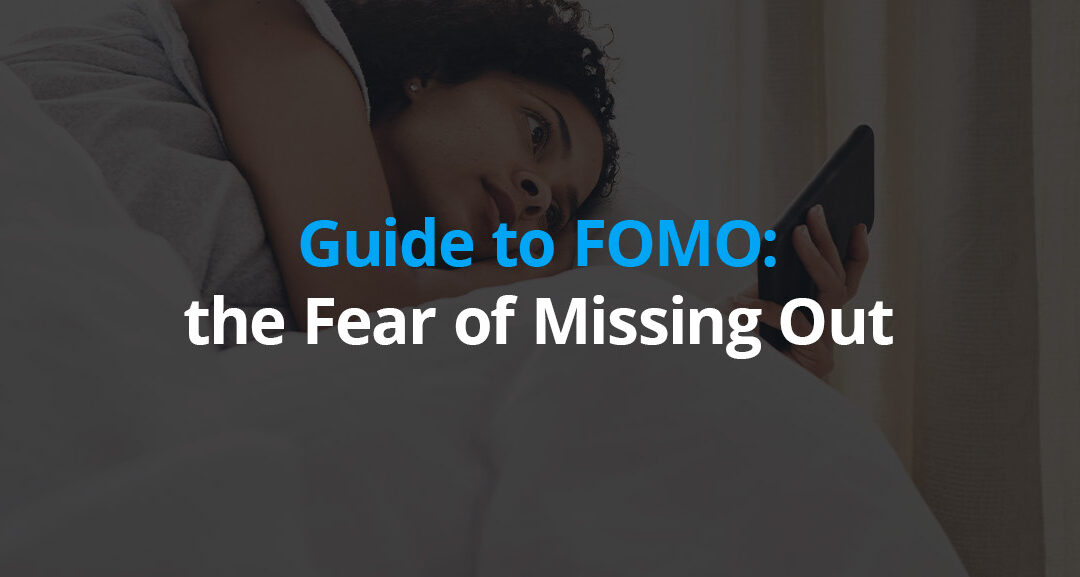What Is FOMO?
The fear of missing out seems self-explanatory, but there’s actually a lot more going on beneath the surface than wishing you had attended a fun-looking event. FOMO is the anxiety and emotional distress you feel when you see an appealing socio-cultural opportunity pass you by. It also encompasses the disappointment that comes with not being invited along and the aching indecision you feel when choosing between two coinciding events.
Some examples of potentially FOMO-inducing situations include:
- Seeing exciting, “perfect” lives on social media.
- Being excluded from a get-together with friends.
- Missing your favorite band play a live show.
- Not being picked for a sports team or cast for a play.
- Watching others do activities you can’t do due to illness or injury.
How Does FOMO Affect Mental and Physical Health?
Fear of missing out brings up more emotions than simply fear. In fact, FOMO can cause a variety of unpleasant feelings, including frustration, disappointment, shame, envy, and regret. Without proper care, these feelings can build into mental health concerns like anxiety, insomnia, and depression, so it’s crucial to address the causes and effects of FOMO as they happen.
Studies suggest that youthful adults with high FOMO levels and feelings of exclusion are more likely to report unhealthy lifestyles and eating habits. When a person’s FOMO gets worse, and their social media use increases as a result, they are more likely to fall into sedentary habits, heightening the risk of obesity, poor posture, and vision issues.
Why Do I Have FOMO?
Although the term “FOMO” was only coined in 2004, the feeling has likely been around for hundreds if not thousands of years. It can creep into your daily life unexpectedly, and when it does, it’s wise to examine why. In the 21st century, FOMO is primarily triggered for three reasons:
1. The Need for Human Connection and Validation
Humans are social creatures. We’ve evolved to feel safe and calm when part of a dependable group and kept in the loop — not just with friends and family but with wider social communities like fandoms, religious groups, professional circles, and schools. When something threatens that feeling of belonging, ancient alarm bells start ringing in our brains, and that’s when FOMO arises.
2. Information Overload on Social Media
A meta-analysis of the psychology of FOMO revealed that loneliness in adolescents is rising, and social media may be a prominent cause rather than the solution. While social media provides a type of social connection, it leaves room for miscommunication and self-comparison that can worsen feelings of isolation and FOMO.
It’s easy to forget that people only post what looks good, so you never get the full picture when assessing someone’s success and happiness through their social media. We’re more prone to FOMO than ever in the age of the internet, with event advertisements and post-party pictures plastered all over our feeds. You may never want to make concrete plans in case something more gratifying comes along. That hesitance is a feature of FOMO, too.
3. Feeling Pressure to Adhere to Social Norms
Even introverted people who don’t crave frequent social interactions can experience the fear of missing out. You may feel excluded from an event not because you wanted to go but because you feel you should have gone to live up to what society expects from you. Social norms change depending on your gender, age, ethnicity, location, occupation, and many other factors. Some examples of FOMO brought about by societal expectations can include:
- Seeing wedding photos despite being indifferent to the institution of marriage.
- Being excluded from an activity your friends know you don’t like, like bar hopping or hiking.
- Watching peers get into prestigious schools you have no interest in attending.
- Having friends participate in religious events like christenings despite you being atheistic.
How Can I Overcome FOMO?
Despite its prevalence in the social media age, having FOMO is not a life sentence, and learning how to overcome FOMO is undoubtedly possible. You can use several strategies to lessen your fear of missing out. These practices have valuable psychological benefits beyond reducing FOMO, so they’re worth a try, even if you initially have doubts.
1. Give Social Media a Break
FOMO can prompt you to check social media compulsively, and this compulsive checking can lead to more FOMO, creating an endless cycle of unhappiness and isolation. If you’re feeling anxious about being left out, missing updates and notifications or not living up to the standard set by edited social media posts, it’s time to moderate your scrolling.
Only keep applications that are serving you. Social media platforms like X (formerly Twitter) or certain corners of Reddit can be rife with vitriol and add little to your quality of life. Experiment with which apps and pages bring you joy and which negatively impact your mental health. Set yourself time limits on the apps you do use, and be mindful of the impulse to check them for new content and notifications constantly.
2. Spend Time With Your Loved Ones
FOMO often happens because people miss their friends and family and wish to spend more time with them. If you’re feeling left out of social gatherings, make your own! Set aside a regular time block dedicated to socializing and maintaining relationships that you cherish. This is especially true for recently graduated people who no longer see their friends by default during the day. Take proactive measures to strengthen those bonds.
3. Practice Gratitude and Self-Acceptance
The pressures and comparisons of modern life can challenge how secure you feel in what you have and how you’re doing. Take some time to reflect on what you love and appreciate about your life and yourself, either by keeping a journal, reciting affirmations, or simply reflecting. Consider things you’ve done, achieved, and enjoyed recently, and remember that you are enough.
When you experience FOMO brought about by societal expectations, ask yourself, “Do I really want to participate, or do I feel like I should appear a certain way?” Realistically, if you only wanted to go to that bar or join that team because you feel it’s expected of you, you probably wouldn’t have enjoyed it to begin with.
4. Discover and Enjoy Your Hobbies
If your life feels like it could be fuller and more gratifying, spend some time exploring your interests and pick up a hobby that reflects them. A fun, stimulating activity like sports, crafting, music, gaming or reading can distract you from doomscrolling and compulsively checking social media. It can also help you enjoy your alone time much more and open up new opportunities to meet people and build connections in your community.
5. Speak With a Therapist
Anxiety is a challenging and complex feeling that can impact your daily life and mental health significantly. Because FOMO triggers anxiety and can lead to mood dysregulation, it’s important to seek help from a mental health professional when you’re feeling overwhelmed. Choose an experienced, compassionate therapist who specializes in anxiety, depression, and stress management.
Overcome FOMO With Merrimack Valley Psychological Associates
At Merrimack Valley Psychological Associates, we’re committed to helping people thrive through exceptional-quality mental health support services. Our team of licensed clinicians and counselors has a wealth of experience treating anxiety disorders, mood disorders, burnout, and other mental health concerns with empathy and confidentiality. To receive the support you need and live your best life, schedule an appointment with us today.



